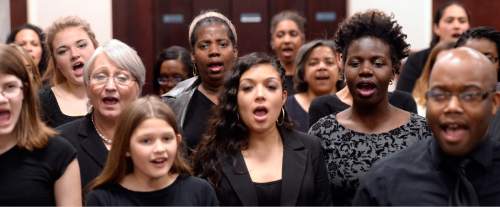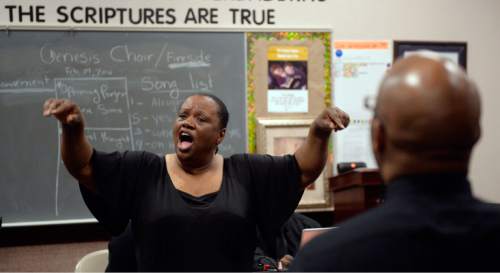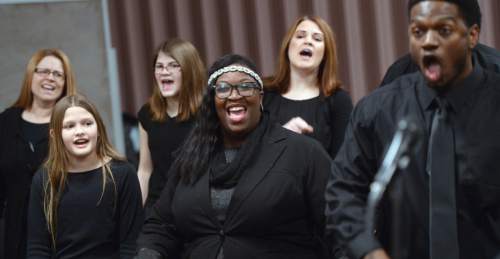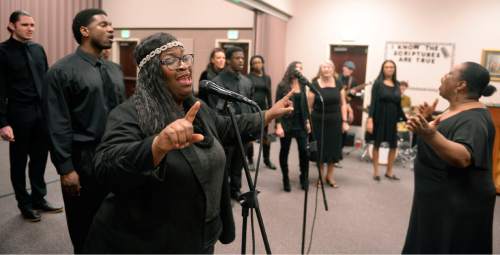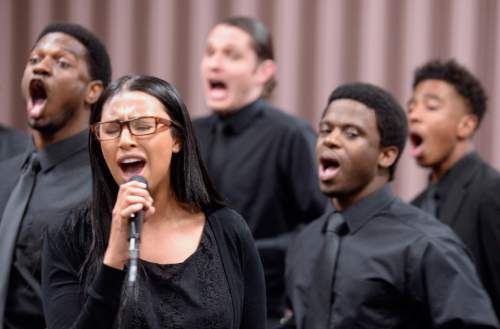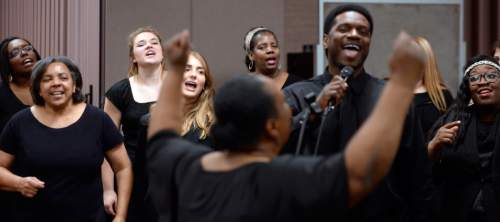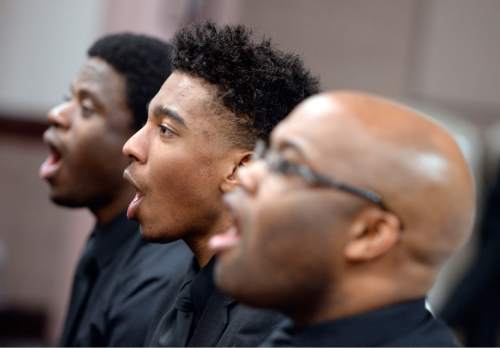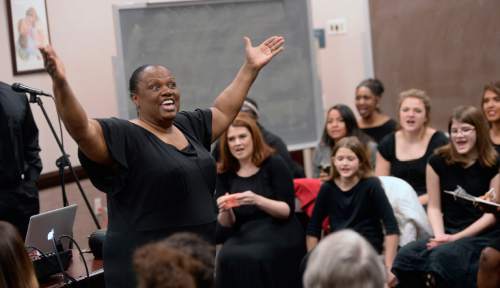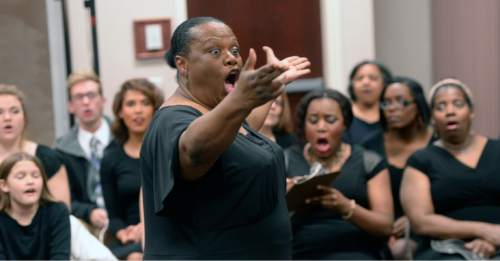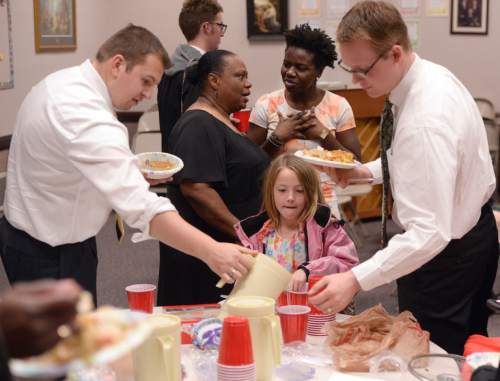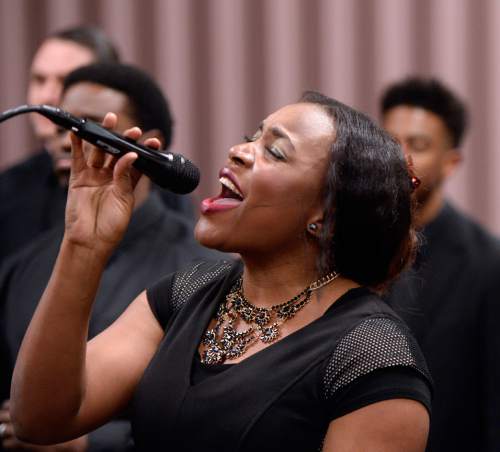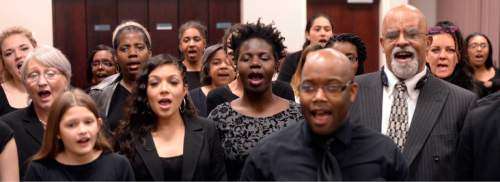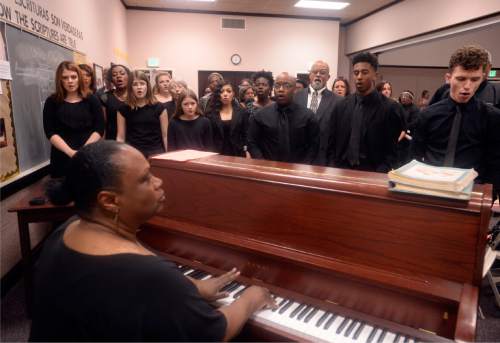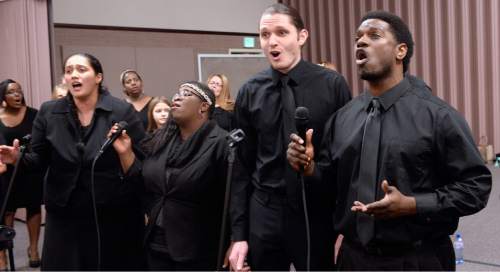This is an archived article that was published on sltrib.com in 2016, and information in the article may be outdated. It is provided only for personal research purposes and may not be reprinted.
Get ready, Utah. There's a new American gospel choir in the Beehive State, and it's not Baptist or Methodist or Pentecostal.
It's Mormon.
More than 30 singers in the mostly black Genesis Gospel Choir are performing across the state and region to mostly white audiences — including at an LDS "fireside" last weekend in Las Vegas — belting out gospel hymns to enthusiastic response. Choir members sway, clap and stomp their feet to make what they believe is "a joyful noise."
They croon familiar praise-and-worship hymns such as "When Jesus Says Yes" and "He's a Battle Axe."
They have "the same mission as the [LDS] church — to bring souls unto Christ," says Genesis Group President Don Harwell, "but we do it through music."
The choir rarely performs during weekly LDS sacrament meetings — though it is an option — but has graced many less-formal meetings and in Mormon chapels.
"A lot of people still don't get it," says Harwell, who also serves in his local LDS bishopric. Latter-day Saints are so stiff they "don't feel comfortable clapping — even though it's OK. They are so locked in standard Mormon culture, they don't realize how many different cultures are now in the church. With South America and Africa, there may be more people of color in the church than white people."
A new start • Genesis choir director Debra Bonner was steeped in gospel music in Michigan as a member of the Missionary Baptist Convention. She was trained in traditional black hymns and classical music, she says, earning degrees in both. At an early age, she was a voice coach and a youth choir director.
Bonner and her husband, Harry Bonner, served as Baptist missionaries in Liberia for a few years before the "spirit told her" to resign and return to the United States. They eventually landed in Las Vegas, where they joined the LDS Church.
That was in 1981, and they have never looked back.
The couple reared eight children in their newfound faith and lived in a handful of states before settling in Utah. Three of their sons have served Mormon missions, and one of them is now an LDS seminary teacher. Bonner was invited to join the Mormon Tabernacle Choir, she says, but her family life was too hectic for the demanding schedule.
"I know this is the Lord's church," Bonner recalls. "But the hardest part has been the music."
It was the kids who begged their mother to add her voice to the tiny group of Genesis singers last fall. Before long, she was asked to be its director.
The choir, she says, has been "a tremendous experience and blessing for us."
Long time coming • For decades, gospel-singing black Mormons seemed like an impossibility in the 15 million-member Church of Jesus Christ of Latter-day Saints. After all, the Utah-based faith had a centurylong prohibition on black men and boys from holding its all-male priesthood. It also barred black girls and women from entering its temples.
In 1971, the church created the Genesis Group as a support for black Mormons, with the late Ruffin Bridgeforth as president and Darius Gray as one of his counselors. The group met monthly to share spiritual testimonies, listen to sermons and socialize.
That all changed in 1978, when then-LDS Church President Spencer W. Kimball announced an end to the priesthood and temple ban on blacks.
After the change, the need to gather diminished and the Genesis Group became dormant for a decade. By October 1996, though, many black members yearned to reconnect, so Genesis re-emerged stronger than ever — with Gray at its head. The soft-spoken journalist led the group until 2003.
Monthly firesides continued the same testimony-giving format and drew larger and larger crowds.
Gospel music always was one of Genesis' appeals, especially among Mormon newcomers, converted to LDS doctrine but not to its culture.
"New members shouldn't have to change their culture," Harwell says, "but be able to bring their culture into the church."
The groundwork was already laid for a gospel choir.
Tekulve Jackson-Vann has been singing at Genesis since the early 2000s, when he enrolled at Brigham Young University. Back then, it was an informal undertaking. Singers simply came an hour early to practice and then filed up to the choir seats during the service.
It touched Jackson-Vann's soul.
"I'm a convert, and my first lessons in the gospel didn't sound like the hymns in the [standard LDS] 'green book' or the talks in sacrament meeting," he says. "I learned it in a very spirited way. It's not that I don't appreciate the Mormon hymns. They have their place in my spiritual journey."
But when he needs "to touch the hem of my savior's garment," says Jackson-Vann, a family therapist and part-time teacher at Salt Lake Community College, "I get that through gospel music."
And that's what participants got when they attended Genesis.
"We gave people a taste of the old gospel church," says Jackson-Vann, often a soloist. "It was so great to share the message of the gospel in a way that people are used to hearing it."
'It's a blessing' • A little more than a year ago, longtime Genesis member and music leader Ellie Mae Johnson had a plan to make the choir more than a casual offering. She envisioned a missionary tool.
So she bought 15 or so purple robes, pushed choir members to practice and found venues for performances. They even talked about recording an album. In November, however, Harwell felt a divine prompting to install Bonner as choir director.
"It was Ellie's passion that put us in a place," Jackson-Vann says, "where we could be fine-tuned by Sister Bonner."
Bonner has pushed choir members to practice weekly, rather than monthly, and to elevate their collective sound. The robes have been replaced by all-black outfits. And they have more invitations to perform than they could have imagined.
"We ... want to bring as many souls as we can to Christ through music," Harwell says. "We know we are doing something right."
The choir wants audiences to know "that being a [Mormon] is not a curse," he says. "It's a blessing."
Can he get an amen?
Twitter: @religiongal —
'Black LDS Heroes' lecture
Mormon co-authors Darius Gray and Margaret Blair Young will present "Black Heroes in Latter-day Saint History" on Thursday at 7 p.m. in the LDS Church History Museum, 45 West Temple, in downtown Salt Lake City.
Gray, former president of the Genesis Group, and Young will explore LDS history in the context of American history, including a description of several black Mormons who took part in early civil-rights movements.


